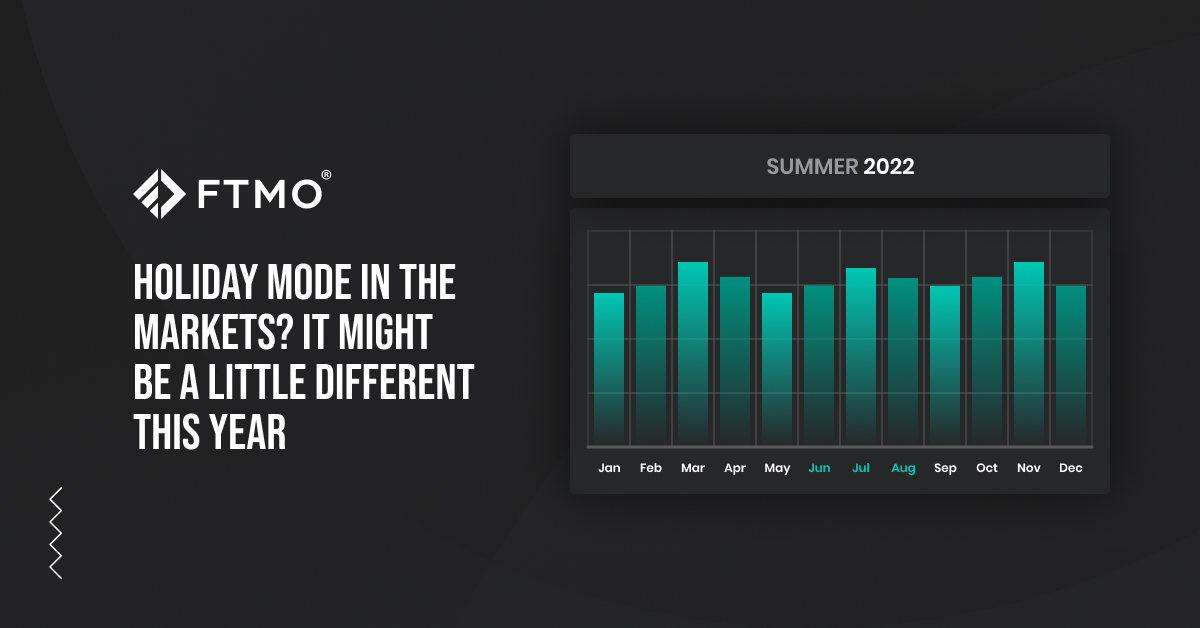
Holiday mode in the markets? It might be a little different this year
Trading on the financial markets in the summer is generally not very popular as liquidity in the markets decreases during the holiday season. This can then lead to increased volatility and less predictable market movements. There is some truth in this, but only part of it. And this year, it even seems somewhat untrue.
Summer and Christmas holidays are very special and specific periods in the financial markets. Most traders mutually agree that summer reduces liquidity in the markets, and because of this, volatility increases. Logically, during the summer, the activity of large institutional investors is limited as people take holidays more frequently, and trading volumes may decrease. Seasonal influences also play a big part in some markets, often affecting their trading volumes. With volatility, it's a bit more complicated. Low volumes can lead to either lower volatility because markets are simply not trading, but also to a higher volatility because there are not enough orders in the market at a specific price.
Sell in May and Go Away?
There is a popular "Sell in May and Go Away" rule in the stock markets, which is closely related to the holiday season and the desire of large investors to make the most of stocks in the first half of the year. But then, when retail investors try to sell stocks in the summer, they often don't get a reasonable price and also, the market trends usually last for a shorter period.
Commodities and seasonality
For commodities, it is even more specific because, in addition to the political situation and fundamentals, seasonality and the impact of industry demand often play a relatively vital role. For example, for oil and natural gas, the most significant market movements usually take place in the autumn when markets are preparing for the winter season. Grain prices also show seasonal influences, dropping significantly before the summer.
The summer season probably has the most negligible impact on the currency market. While trading volumes may be lower than average in other months, the effect on volatility can be mixed. According to some analysts, lower liquidity leads to lower volatility because fewer traders are in the market. Another theory, however, predicts an increase in volatility because traders are more likely to have to open positions at a worse price due to low liquidity. In any case, movements in forex are a bit harder to predict in the summer, especially when it comes to swing or position traders.
A bit of a different year
Due to inflation, relatively lively events on the commodity markets this year and surprising moves by central banks, it is not so much about resting as the opposite. The war in Ukraine has also had a major impact on trading, especially in the commodity markets for oil and gas. In addition, Russia's decision on whether to send natural gas to Europe has a significant effect on prices, and it certainly does not look like the holiday season in the market. The last two years have also impacted commodity markets, with the Covid-19 disease pandemic affecting the markets, causing supply chains to be disrupted and shortages to occur.
The problem is that in China, restrictive rules are still being implemented in selected areas today, which is also creating tensions in the markets and investors and traders must take into account possible shortfalls on the demand side.
Inflation and central banks also have a significant impact on the markets. After years of loose monetary policy, they have started to raise interest rates quite aggressively because of rapidly rising prices, which impacts forex, equities and commodities alike. As a result, the US dollar has hit record highs, is at parity with the euro, and the Japanese yen is at 24-year lows against the dollar.
Since we are not yet at the end of summer and August is considered the month when vacations and less activity in the markets are most evident, we may yet see some holiday mode in the markets, which may significantly affect swing and long-term traders in the equity, index and commodity markets. However, traders favouring forex and intraday access or scalping are unlikely to complain about the holiday mode. So if you want to trade, nothing is likely to stop you.
About FTMO
FTMO has developed a two-step evaluation process to find trading talents. Upon successful completion, you may be eligible for an FTMO Rewards Account with a balance of up to $200,000 in simulated funds. How does it work?








